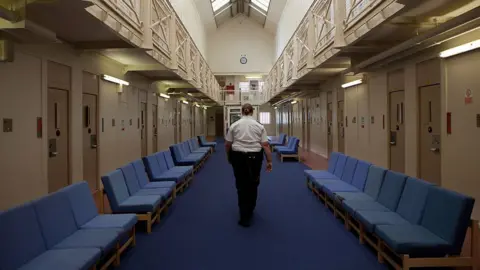Prison: Justice system makes many women reoffend, report finds
 Getty Images
Getty ImagesThe criminal justice system is failing women in Wales and causing many of them to re-offend, a cross-party Welsh Parliament inquiry has concluded.
The report found that sentences as short as a week were normal, causing huge disruption to women's lives but with no opportunity for rehabilitation.
Labour's Jenny Rathbone, who chaired the inquiry, called such sentences "completely counter-productive".
UK ministers said they were "investing millions" in tackling female offending.
The report by the Senedd Social Justice Committee said that because Wales has no women's prisons women in custody will be, on average, a 100 miles from home.
It considered figures from the charity Women in Prison, indicating that 56.1% of women serving a custodial sentence will reoffend within a year.
That figure rises to 70.7% of women released after a prison sentence of less than a year.
Prisons, courts and parole come under the UK government, while services dealing with substance misuse, physical and mental health and housing are a matter for Welsh ministers.
The Social Justice Committee is calling for women's involvement in criminal justice to be made the responsibility of the Welsh government, rather than UK ministers.
Ministers in Wales could then increase efforts to make sentencing and rehabilitation more effective, according to the report.
 Senedd Cymru
Senedd CymruMs Rathbone, Senedd member for Cardiff Central, said sentences as short as a week provided "just enough time for a woman to lose her home, her job, and her family; but not enough time for any meaningful intervention which aims at rehabilitation or tackling underlying issues".
"We recognise that some women are in prison because of the seriousness of their crimes.
"But the vast majority are given short custodial sentences for non-violent offences, which are completely counter-productive."
Such sentences, she said, were "traumatic" for the individuals, "devastating for their children" and "eye-wateringly expensive".
Ms Rathbone said she hoped her committees report would help "end the cycle of trauma and waste of public money" of the current system.
What do the two governments say?
A spokesperson for the UK government's Ministry of Justice spokesperson said: "We know the root causes of female offending are often poor mental health, addiction and abuse, which is why we are investing millions into community services like women's centres, drug rehabilitation and accommodation support so women can turn their backs on crime."
The Welsh government welcomed the report and said it will "formally reply to the recommendations once it has been fully considered".
A spokesperson said: "We want to reduce the number of women in the criminal justice system by intervening earlier to keep them safe and address the vulnerabilities that often lead to crime.
"The Women's Justice Blueprint for Wales sets out our key aspirations for women in, or at risk of entering, the system, and the guiding principles through which we aim to deliver these changes.
"It is based on early intervention and prevention, considering how we can further divert people away from crime in the first place and work with women currently in contact with the justice system in a holistic and rehabilitative way."
